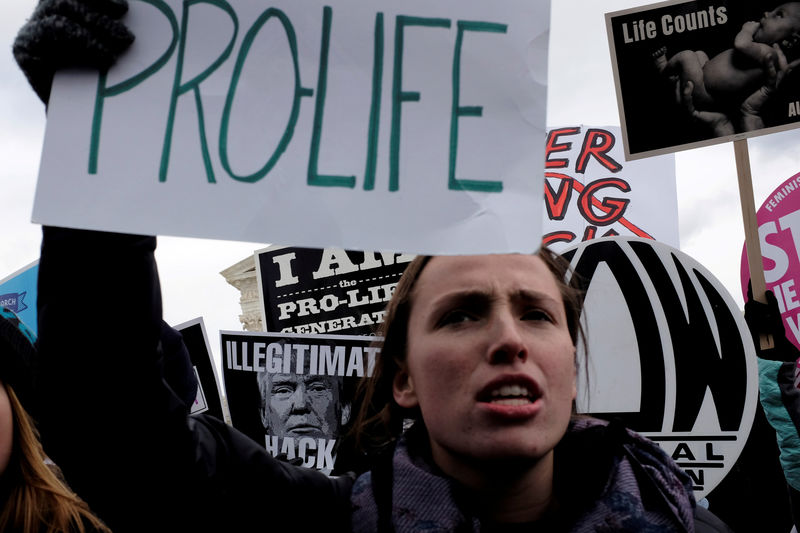By Lawrence Hurley
WASHINGTON (Reuters) - President Donald Trump urged lawmakers in his State of the Union address to put new limits on abortion, but partisan division in the U.S. Congress means the Supreme Court likely will set the agenda on the divisive issue, as it has for decades.
Bolstered by Trump's appointment of two conservative justices, the nine-member court could soon begin to pare back abortion rights, starting with a major case from Louisiana that is one of several similar pending appeals.
The addition of Trump appointees Brett Kavanaugh and Neil Gorsuch could alter the conservative-majority court's approach to abortion. Kavanaugh replaced Justice Anthony Kennedy, a conservative who backed abortion rights in key rulings in 1992 and 2016.
Jennifer Popik, director of federal legislation for the anti-abortion National Right to Life Committee, said her group hopes Kavanaugh and Gorsuch will "interpret the Constitution more narrowly" on abortion rights.
In Congress, legislation backed by Trump's fellow Republicans already has been introduced to restrict late-term abortions along the lines discussed by Trump, but there are not enough votes to pass it given Democratic opposition.
Abortion is one of the most contentious issues in U.S. politics. Trump, whose abortion views have been fluid over the years, has emerged as an advocate of more restrictions, a position that appeals to his conservative voter base.
His address on Tuesday night in some ways kicked off his 2020 re-election campaign. His call for new limits on late-term abortions was welcomed by anti-abortion activists.
When he ran for president in 2016, Trump said he would appoint anti-abortion judges who would vote to overturn the landmark 1973 Supreme Court ruling Roe v. Wade that recognized a woman's constitutional right to abortion and legalized the procedure nationwide.
In his State of the Union address, Trump criticized a New York law and legislation in Virginia that would in limited circumstances allow for late-term abortions when the mother's health is endangered.
"To defend the dignity of every person, I am asking the Congress to pass legislation to prohibit the late-term abortion of children who can feel pain in the mother's womb," Trump said during the speech, without specifying details.
A White House spokeswoman said Trump backs legislation pending in Congress that would ban abortions after 20 weeks.
'SMOKE AND MIRRORS'
Jennifer Dalven, a lawyer with the American Civil Liberties Union, which backs abortion rights, called Trump's comments "smoke and mirrors."
"This is really just a distraction. The goal is not to end a certain class of abortion. His goal is to end all abortions," Dalven added.
There is no nationwide law setting a specific limit on when in a pregnancy abortions can be performed. Each state has its own laws, with conservative states imposing restrictions and liberal states more broadly backing abortion rights.
Republicans have embraced the federal legislation to ban abortion after 20 weeks. But past bills have failed to overcome Democratic opposition, even when Republicans controlled both the House of Representatives and the Senate.
With the House now led by Democrats and the Senate by Republicans, there is even less chance of such legislation passing, though Republicans said on Wednesday they would press for a vote.
As of the end of last year, 17 states had laws banning abortions 20 weeks after fertilization, according to the Guttmacher Institute, a nonprofit research organization that supports abortion rights. No states categorically ban all late-term abortions in all circumstances and 43 states have laws that impose at least some restrictions, it said.
The Roe v. Wade ruling, reaffirmed by the high court in 1992, concluded that abortion could not be banned before the fetus is viable, but gave states leeway to impose greater restrictions on it toward the end of a pregnancy.
In 2007, the court upheld a federal restriction on "partial-birth abortions" that involve a physician removing most of the fetus intact rather than dismembering it.
In its most recent major abortion ruling, the Supreme Court - with Kennedy joining the court's four liberals in the majority - in 2016 struck down regulations in Texas that abortion rights advocates said would shutter many clinics.
The Louisiana case pending before the justices resembles the Texas case. It involves a requirement that doctors who perform abortions have a difficult-to-obtain arrangement called "admitting privileges" at a hospital within 30 miles (48 km) of the clinic.
The provision was challenged by abortion rights advocates. If the court rejects their request, it would represent a shift away from the 2016 ruling following Kennedy's retirement.
The court will also decide soon whether to hear Indiana's bid to revive a state ban on abortions performed due to the sex or race of the fetus or evidence of disability. Indiana this week asked the Supreme Court to hear another abortion case concerning a law to require fetal ultrasounds before abortions take place.
